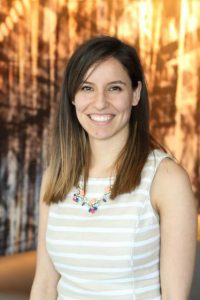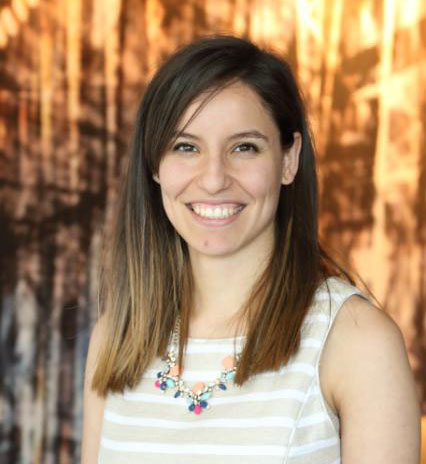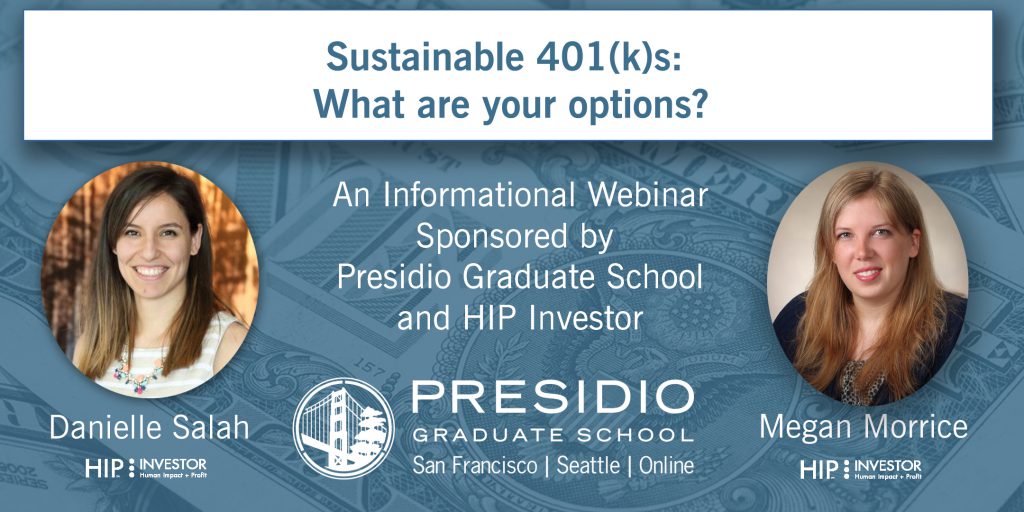 Danielle Salah, SF Cohort 21
Danielle Salah, SF Cohort 21
Vice President of Impact Analytics
at HIP Investor
Danielle builds and manages HIP Investor’s database of impact metrics on municipal bond issuers, and uses the data to create customized solutions that add value for the company’s clients by providing them with smart data which drives higher impact investment decisions. She received her MBA in Sustainable Management from Presidio Graduate School, where she focused on technology-enabled solutions for impact investing. She was previously a Climate Corps Fellow with the Environmental Defense Fund where she focused on bringing energy efficiency solutions to public school districts on the east coast. In previous roles, she has worked to further sustainability in the industries of technology, entertainment, and higher education.
______________________________________________
What is the best career advice you ever received?
Know what you’re good at, know what you want, and be able to talk about both.
It may seem intuitive, but I believe most people haven’t actually stopped to discover what they’re good at and what they want to do, much less know those things well enough to talk comfortably about them when the moment is right. But if you have all these things down, you’re much more likely to maximize networking opportunities and find the allies and mentors who will help get you to where you want to be.
What’s the next big project you want to personally tackle?
I have recently gone back to school to start a Masters of Information and Data Science at UC Berkeley. This is my first pursuit, educational or professional, that has not had a specific focus on sustainability, and being part of a community that does not have such an intrinsic focus on these types of core values felt like it would be a significant adjustment for me. I was surprised to find, however, that a majority of my classmates and professors do share these values of environmental stewardship and social justice, whether their work is in an impact space or not. As I focus on using data science as a force for good in the next stages of my career, I will also be paying attention to ways that allies from the “traditional” private sector can be leveraged to create meaningful change across all types of organizations.
How would you describe/define ‘sustainability’ to a 10-year-old?
Doing something in a way such that it can continue to be done that way for the foreseeable future.
Often sustainability responds to wicked problems, what keeps you hopeful and productive?
I think many individuals today are aware of some of the larger sustainability problems the world faces, and it has become common for individuals to alter their behavior to “do their part.” Especially here in San Francisco, people bringing reusable shopping bags to the grocery store or separating their compost for proper disposal seems to be the rule rather than the exception. Of course, these are not representative of the extent to which solutions need to have large scale effect on the world, but the fact that most of us seem to be converging on a common language and small set of solutions keeps me feeling hopeful for our future.
How did you come to find out about PGS? Why did you choose it above others?
I first heard about PGS when interning on the Infrastructure Sustainability team under Lyrica McTiernan (C11) and Alyssa Holt (C11) while I was in college. After completing my undergraduate degree in engineering,
I knew I wanted to attend business school because of my conviction that the private sector could be a powerful force for good, and PGS stood out above all the others for its innovative and mission-aligned approach to training future leaders and change makers.
What makes PGS different from all other graduate schools?
There are a number of things that I believe makes PGS stand out from other graduate schools, but for me, the single thing that rises to the top is the amazing students that go through the program.
What makes a PGS student or alumnus/a different from a traditional student?
When a community is based on such a strongly held set of values, its members are able to support each other in ways that wouldn’t otherwise be possible. The PGS network is probably the single greatest asset I gained by attending PGS.
I can thank my PGS network for the job I have now, some of the greatest friends I could ever hope to make, and a never-ending supply of support, information, and inspiration.
What tools and skills did you acquire at PGS that you still use today?
During my time at PGS, I kept a running list in the back of a notebook of the skills and frameworks I learned at PGS that I felt would help me professionally, particularly during interviews. For example, the 5 Dynamics test we completed in Leadership taught me how to build strong teams of individuals who balanced each other’s strengths and weaknesses. After completing my EDF Climate Corps Fellowship, I wrote about some other skills PGS gave me that made me a more effective change agent.
What are the most helpful/meaningful connections that you have leveraged thus far?
I still meet with my Capstone team on a regular basis. We have all anchored our careers somewhere in the impact investing universe, and it has proven extremely valuable to have that tight-knit network to go to for career advice, feedback on upcoming projects, and an automatic wingman/wingwoman at networking events.
Register for the next HIP Investors webinar 10/24/17 @ 1:00 HERE.


